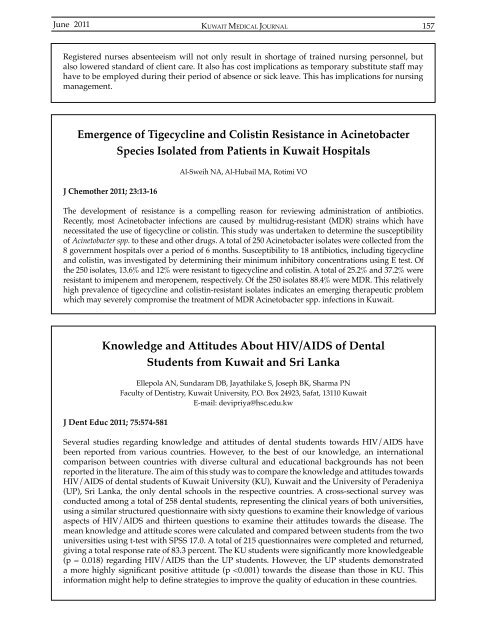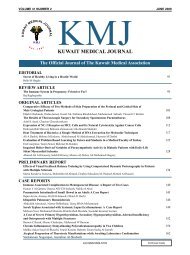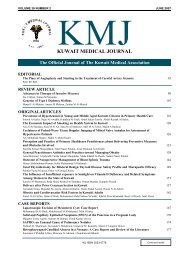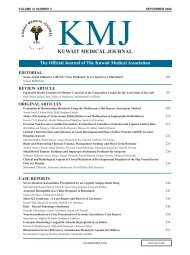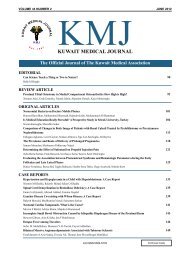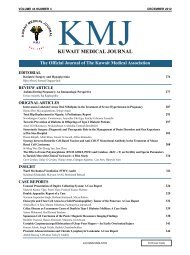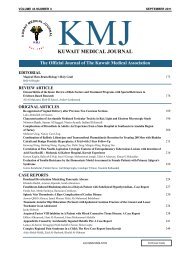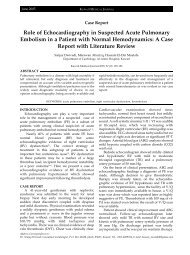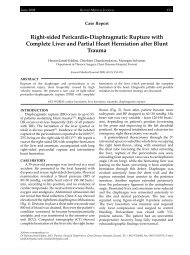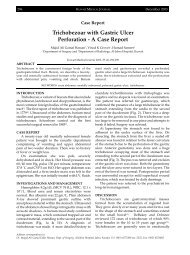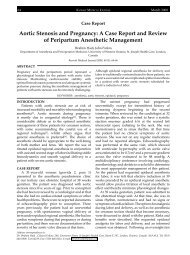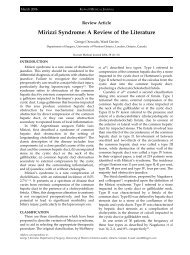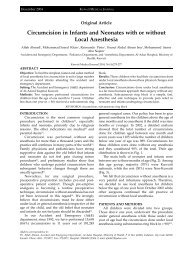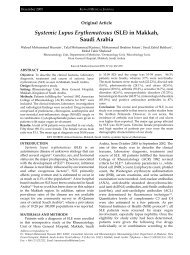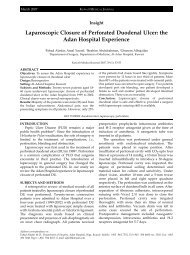Vol 43 # 2 June 2011 - Kma.org.kw
Vol 43 # 2 June 2011 - Kma.org.kw
Vol 43 # 2 June 2011 - Kma.org.kw
You also want an ePaper? Increase the reach of your titles
YUMPU automatically turns print PDFs into web optimized ePapers that Google loves.
<strong>June</strong> <strong>2011</strong><br />
KUWAIT MEDICAL JOURNAL 157<br />
Registered nurses absenteeism will not only result in shortage of trained nursing personnel, but<br />
also lowered standard of client care. It also has cost implications as temporary substitute staff may<br />
have to be employed during their period of absence or sick leave. This has implications for nursing<br />
management.<br />
Emergence of Tigecycline and Colistin Resistance in Acinetobacter<br />
Species Isolated from Patients in Kuwait Hospitals<br />
J Chemother <strong>2011</strong>; 23:13-16<br />
Al-Sweih NA, Al-Hubail MA, Rotimi VO<br />
The development of resistance is a compelling reason for reviewing administration of antibiotics.<br />
Recently, most Acinetobacter infections are caused by multidrug-resistant (MDR) strains which have<br />
necessitated the use of tigecycline or colistin. This study was undertaken to determine the susceptibility<br />
of Acinetobacter spp. to these and other drugs. A total of 250 Acinetobacter isolates were collected from the<br />
8 government hospitals over a period of 6 months. Susceptibility to 18 antibiotics, including tigecycline<br />
and colistin, was investigated by determining their minimum inhibitory concentrations using E test. Of<br />
the 250 isolates, 13.6% and 12% were resistant to tigecycline and colistin. A total of 25.2% and 37.2% were<br />
resistant to imipenem and meropenem, respectively. Of the 250 isolates 88.4% were MDR. This relatively<br />
high prevalence of tigecycline and colistin-resistant isolates indicates an emerging therapeutic problem<br />
which may severely compromise the treatment of MDR Acinetobacter spp. infections in Kuwait.<br />
Knowledge and Attitudes About HIV/AIDS of Dental<br />
Students from Kuwait and Sri Lanka<br />
J Dent Educ <strong>2011</strong>; 75:574-581<br />
Ellepola AN, Sundaram DB, Jayathilake S, Joseph BK, Sharma PN<br />
Faculty of Dentistry, Kuwait University, P.O. Box 24923, Safat, 13110 Kuwait<br />
E-mail: devipriya@hsc.edu.<strong>kw</strong><br />
Several studies regarding knowledge and attitudes of dental students towards HIV/AIDS have<br />
been reported from various countries. However, to the best of our knowledge, an international<br />
comparison between countries with diverse cultural and educational backgrounds has not been<br />
reported in the literature. The aim of this study was to compare the knowledge and attitudes towards<br />
HIV/AIDS of dental students of Kuwait University (KU), Kuwait and the University of Peradeniya<br />
(UP), Sri Lanka, the only dental schools in the respective countries. A cross-sectional survey was<br />
conducted among a total of 258 dental students, representing the clinical years of both universities,<br />
using a similar structured questionnaire with sixty questions to examine their knowledge of various<br />
aspects of HIV/AIDS and thirteen questions to examine their attitudes towards the disease. The<br />
mean knowledge and attitude scores were calculated and compared between students from the two<br />
universities using t-test with SPSS 17.0. A total of 215 questionnaires were completed and returned,<br />
giving a total response rate of 83.3 percent. The KU students were significantly more knowledgeable<br />
(p = 0.018) regarding HIV/AIDS than the UP students. However, the UP students demonstrated<br />
a more highly significant positive attitude (p


